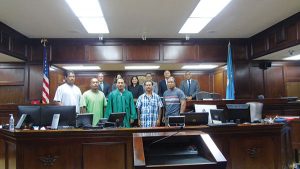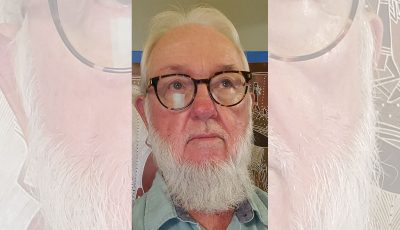Daniel Muna Quitugua is 3rd DORE graduate

Daniel Muna Quitugua, in green robe, poses with four other participants of the Drug Offender Re-entry Program, DORE committee member Janet H. King, and U.S. District Court for the NMI Chief Judge Ramona V. Manglona during a graduation ceremony in federal court yesterday afternoon. Quitugua is the third person to graduate from DORE Program. (Ferdie de la Torre)
Daniel Muna Quitugua, 39, started smoking marijuana at the age of 12 and began using methamphetamine or “ice” at 14. He spent most of his adult life in prison for various offenses. Yesterday, he graduated from the federal court’s Drug Offender Re-entry Program.
“I just want to focus on my life, my job, my family,” said the tearful Quitugua, speaking on the podium shortly after U.S. District Court for the NMI Chief Judge Ramona V. Manglona presented him with a certificate of completion.
Quitugua was accepted to the DORE Program in December 2016. He became the third person to graduate from the DORE program. “Drug Court helped me realize the real me,” he said.
Of Manglona, Quitugua said: “She believes in me. I got a second chance to get a better life.”
He was also thankful to DORE team members, whom he described as family.
Quitugua’s supervised release will now expire on Sept. 11, 2018, instead of 2019.
Manglona said Quitugua has passed all drug and alcohol tests, paid restitution, attended all counseling sessions, and is now employed.
She said the DORE Program is intended to help people like Quitugua. She recalled that, in the first three months with the DORE Program, Quitugua had a lot of troubles. Quitugua almost got kicked out of the program.
Attorney Janet H. King served as the guest speaker during the graduation ceremony. King used to serve as co-counsel of attorney Michael Dotts in one of Quitugua’s cases. Dotts was also present in the courtroom.
The DORE Program is a post-incarceration cooperative effort program of the U.S. District Court, U.S. Probation Office, Federal Public Defender, and U.S. Attorney’s Office.
DORE provides treatment and sanction alternatives to address re-integration into the community for non-violent, substance abuse offenders released from federal prison.
Quitugua was convicted in federal court in 2005 for conspiracy to commit Hobbs Act robbery and using and carrying a firearm during a crime of violence.
In April 2005, the federal court slapped Quitugua with a 120-month prison term, followed by a five-year supervised release over an armed robbery at a poker establishment in 2004. Quitugua’s supervised release began on Jan. 14, 2013. His supervised release was revoked several times.
In July 2014, Quitugua pleaded guilty to resisting arrest and was slapped by the Superior Court with a six-month prison term.
Superior Court Associate Judge Kenneth L. Govendo sentenced him to six months in prison, but gave him credit for time served.
Police arrested Quitugua for allegedly over-speeding, running away from police officers, and leaving a bag that contained three illegal guns and bullets near Northern Marianas College on May 23, 2014.
An indictment was then filed in federal court, charging Quitugua with one count of felon in possession of firearm in connection with his arrest near NMC.



























